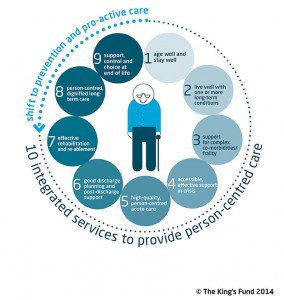
Frailty is personally and systematically important. How we assess and care for frail older people is a recurring theme in the NHS and within ECIST (NHS emergency care intensive support team). Five years ago the words frail and frailty were rarely used outside gerontology departments, yet now they are spoken daily throughout health and social care systems. I would suggest that, currently, there is a great deal of variation in our care.
Variation between regions, hospitals, community services, teams and even between individuals whose aim is to provide care in frailty crises. ECIST use the phrase ‘simple rules in complex systems’. We advocate checklists, agreed professional standards and the use of data to evaluate changes we make to our services. There have been improvements in the care of other diagnoses by this approach, stroke, hip fracture and ST elevation myocardial infarction. Sepsis treatment is a prime and current example with care bundles aimed at identification followed by a set of simple tasks within time limits.
There are simple tools to find frailty. None are perfect but at least they encourage clinicians to find patients at risk of frailty. Once identified, frail people need us to deliver high quality care. The cornerstone is CGA - Comprehensive geriatric assessment is a multi-dimensional, inter-disciplinary diagnostic process to determine the medical, psychological and functional capabilities of a frail older person in order to develop a co-ordinated and integrated plan for treatment and long-term follow-up. It is validated as an intervention and is what we should be doing whenever our trigger tool finds someone who is frail. It needs a team with the necessary skills, and it needs to be done on, or very soon after, arrival. www.acutefrailtynetwork.org.uk Back to simple rules. Find people who have frailty by agreeing to use a simple tool, then use CGA every time. We would want it for ourselves.
Dr Jack Hawkins - Clinical Director (ECIST) @jackhawski


